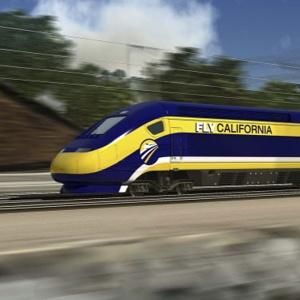Bullet-train agency chided for deceptive claim
by Chris Reed | June 8, 2015 9:01 am
 The California High-Speed Rail Authority’s first business plan warned that the project would struggle to attract outside investors without some sort of revenue or ridership guarantee. That led the Legislative Analyst’s Office to repeatedly warn such guarantees would be illegal[1] under Proposition 1A, the 2008 bond measure approved by voters giving $9.95 billion in seed money to the project. That’s because if the guarantees weren’t met, taxpayers would have to provide subsidies to the investors, which Prop. 1A forbids[2].
The California High-Speed Rail Authority’s first business plan warned that the project would struggle to attract outside investors without some sort of revenue or ridership guarantee. That led the Legislative Analyst’s Office to repeatedly warn such guarantees would be illegal[1] under Proposition 1A, the 2008 bond measure approved by voters giving $9.95 billion in seed money to the project. That’s because if the guarantees weren’t met, taxpayers would have to provide subsidies to the investors, which Prop. 1A forbids[2].
However, the rail authority has consistently maintained it has identified several potential investors. Los Angeles Daily News business columnist Susan Shelley, who attended recent community meetings sponsored by the authority in the San Fernando Valley, writes that[3] these claims are misleading:
[State officials] insisted that the bullet train is financially viable and won’t need taxpayer subsidies to operate. They offered up a stack of year-old letters[4] from private sector companies as evidence.
But the letters are about construction loans, not financial self-sufficiency. In the very first letter a CEO writes, “we believe that long-term funding by the State is needed.”
The second letter says the project could be completed “with funds from the state” in combination with private financing, if the state provides “a multi-year source of repayment.”
The would-be private sector partners were offering to help us borrow money, which we would then give to them to build the bullet train.
Schwarzenegger wanted China as partner
I once had a conversation about the California bullet-train project with a high-powered Wall Street analyst whose primary focus is large public-private collaborations on big infrastructure projects. (The analyst was in San Diego to consult on stadium plans.)
The analyst laughed at the idea that the state of California would attract a private sector investor because of the ban on even the possibility of subsidies.
At least some members of the Schwarzenegger administration must have reached this conclusion as well. It’s why Gov. Arnold Schwarzenegger traveled to China in 2010 to seek a bullet-train partner[5]. The Chinese government encouraged Schwarzenegger to believe this was in the realm of possibility.
But more recent coverage has depicted China and other nations with high-speed rail experience as wanting to be a contractor-financier, not a partner:
Chinese state firms are poised to be strong contenders in the race to make high-speed trains that will sprint between Los Angeles and San Francisco, part of a $68 billion project to bring the service to the United States for the first time.
While “bullet train” manufacturers from Germany, Japan, South Korea and France are expected to be among those jockeying for the estimated $1 billion train contract, China’s ability to offer low prices and hefty financing appear to make it the one to beat, say lobbyists and industry insiders.
That’s from a May 21 Reuters story[6].
- illegal: http://www.lao.ca.gov/reports/2011/trns/high_speed_rail/high_speed_rail_051011.pdf
- forbids: http://www.ocregister.com/taxdollars/strong-478648-rail-high.html
- writes that: http://www.dailynews.com/business/20150605/bullet-train-puts-californias-future-in-the-hole
- a stack of year-old letters: https://www.scribd.com/doc/267795173/Companies-eager-to-get-bullet-train-business-write-to-California-Gov-Jerry-Brown
- partner: http://The%20second%20letter%20says%20the%20project%20could%20be%20completed%20“with%20funds%20from%20the%20state”%20in%20combination%20with%20private%20financing,%20if%20the%20state%20provides%20“a%20multi-year%20source%20of%20repayment.”%20%20The%20would-be%20private%20sector%20partners%20were%20offering%20to%20help%20us%20borrow%20money,%20which%20we%20would%20then%20give%20to%20them%20to%20build%20the%20bullet%20train.
- story: http://www.reuters.com/article/2015/05/21/us-california-rail-china-idUSKBN0O60FT20150521
Source URL: https://calwatchdog.com/2015/06/08/bullet-train-agency-chided-deceptive-claim/